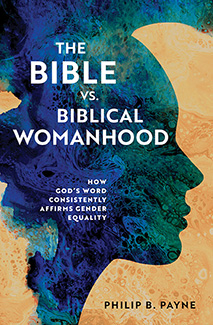
What the Bible Says About Gender Equality
I used to believe in “biblical manhood and womanhood”—that God ordained male headship in the home and in the church, that wives must submit to their husbands, but that husbands do not have to submit to their wives.
I no longer believe in “biblical manhood and womanhood” because it is not biblical.
Like many Christians, I took for granted that the Bible supports gender hierarchy in the church and the home. I grew up in a happy home where my father was the head of the house. Women never preached in our church. Men made church decisions.
I learned to read, love, and believe the Bible as the inerrant Word of God from my father, J. Barton Payne, who devoted his life to studying and teaching Scripture. Nevertheless, I had no assurance that I would have eternal life until at a Christian camp as a junior high student I realized that God, who cannot lie, promised eternal life to all who believe in Jesus Christ (John 3:16; Titus 1:2). I fell on my knees and asked forgiveness for not believing God’s promise in Scripture. I was overjoyed with assurance of faith, an assurance that has never left me because it is based on God’s written Word.
During my junior year as a pre-med student, I had the joy of seeing a blind boy named Joel transformed by faith in Jesus Christ beyond anything medicine could do. So, with honors in literature and a growing love of the Bible, instead of going to medical school, I served for fourteen months as a “helping hand” missionary in Japan with The Evangelical Alliance Mission. My pastor in Nagoya told me that the greatest need of the evangelical church in Japan was someone with a PhD in New Testament, preferably from Cambridge University. So, after finishing my MA in New Testament and MDiv at Trinity Evangelical Divinity School, I entered the New Testament PhD program at Cambridge.
About a month after arriving in Cambridge, a lecturer stated, “No passage in the New Testament, understood in its original context, limits the ministry of women.” I almost stood up and shouted, “That’s not true.”
I thought 1 Timothy 2:12’s prohibition of women teaching men was the perfect refutation. So that evening I read 1 Timothy in Greek and continued to do so repeatedly for over a month. I was struck by the letter’s pervasive concern with false teaching. Since women are the only people 1 Timothy identifies as deceived by the false teaching, this explains why Paul prohibited women in Ephesus from seizing authority to teach a man. Realizing that 1 Timothy 2:12 does not disprove the lecturer’s statement, I began to examine every other passage about women in the Bible. Forty-nine years of research later, I still have not found any original passage of the Bible that prohibits women from engaging in any church ministry.
The Bible’s teaching matters on this issue because the Bible is the Word of God, authoritative for all Christians. And if God teaches it, that settles it. The Bible, not contemporary culture, should guide what we believe and how we live.
While I still believe that the Bible is inerrant, I no longer believe in “biblical manhood and womanhood.” My view did not change because I rejected the authority of Scripture. My view changed because I examined the very Bible passages that I thought established gender hierarchy. It is precisely those passages, including 1 Corinthians 11:2–16, 1 Corinthians 14:34–35, Ephesians 5, 1 Timothy 2–3, Titus 1–2, and 1 Peter 3 that caused me to reject the exclusion of women from leadership in the church and the home.
Of course, given its cultural setting, the Bible has many examples of men in leadership, and far fewer of women in leadership. It describes the creation of the first human as male and Israel’s official priests as male. Most of the identified authors of Scripture are male. Jesus is male and chose twelve male apostles. God is addressed as Father. Some consider this sufficient evidence that God desires a hierarchy of males in authority over women.
However, when we look more closely, we find that the Bible emphasizes:
• the Holy Spirit gifts all believers for ministry
• the oneness of the body of Christ (the church) and the priesthood of all believers
• the humility, service, and mutual submission required of all believers
These principles are where the biblical emphasis lies, and Scripture never teaches that men and women have separate “roles.” We should not infer from the Bible’s descriptions of patriarchal societies that it endorses patriarchy any more than its descriptions of polygamy endorse polygamy. The Greek texts of Ephesians 5 and 1 Peter 3 that supposedly teach male headship and female subordination actually teach mutual voluntary yielding in love. Passages that stress the equality of men and women, including Romans 16, 1 Corinthians 7, 1 Corinthians 11:11–12, and Galatians 3:28, are not exceptions to the rule of male headship. They express the Bible’s consistent, harmonious message of gender equality. No word meaning headship ever occurs in the Greek or Hebrew texts of Scripture.
Read more in my book, The Bible vs. Biblical Womanhood, where I explain how the text of Scripture itself affirms gender equality. Its emphasis is Christ-like service. Scripture, and Paul in particular, fights tenaciously for groups who are being excluded from full fellowship or denied equal rights.

The Bible vs. Biblical Womanhood
The Bible vs. Biblical Womanhood is a biblical defense of egalitarianism that relies on Scripture to affirm gender equality in the church and in the home. Philip B. Payne examines 14 Bible passages throughout the Old and New Testaments, using careful exploration of Greek and Hebrew word meanings, historical and cultural context, and examples from Scripture. He defends his position by providing detailed answers to common objections at the end of each chapter.
Learn More






